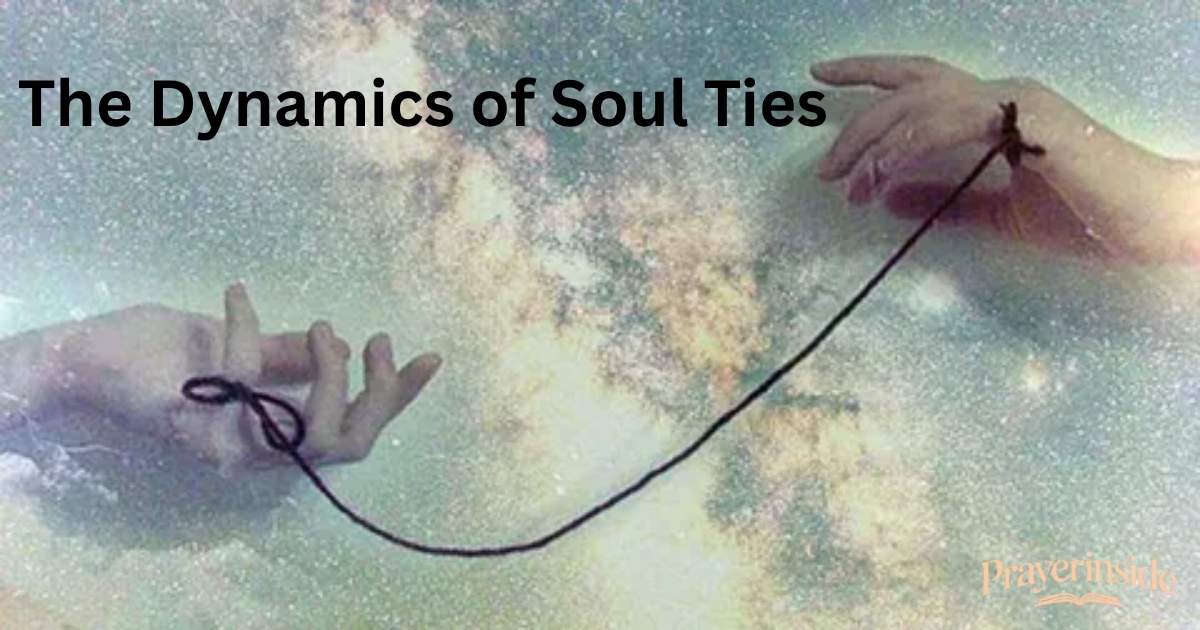Soul ties are powerful connections that link people in emotional, spiritual, or physical ways. But what are soul ties exactly? Soul ties can happen in romantic relationships, close friendships, familial relationships, or even professional relationships. They can feel strong and lasting, sometimes in ways that surprise you. Many people wonder, what’s a soul tie? A soul tie definition is a bond that goes beyond normal attachment. Soul ties can be healthy, like those in marriage or mentorship, or unhealthy, like in toxic relationships.
You might ask, are soul ties real? Many people feel their effects deeply. Soul ties can create emotional bonds, obsessive thoughts, or even separation anxiety. Knowing the signs of can help you protect your emotional freedom. Understanding soul ties is the first step to breaking unhealthy ones.
What are soul ties?
Soul ties are deep connections between two people. They go beyond normal friendships or relationships. Soul ties can form in romantic relationships, close friendships, familial relationships, or even professional relationships. These bonds can be emotional, spiritual, or physical.
So, what are soul ties really? A soul tie definition is a strong link that affects your thoughts, feelings, and even your behavior. Soul can be positive, like the bond in a healthy marriage or a mentorship, giving support and emotional well-being. But they can also be negative, like in toxic relationships or abusive situations, causing emotional turmoil, obsessive thoughts, or separation anxiety.
Many people ask, are soul ties real? While not scientifically proven, the effects of soul are very real for those who experience them.
Do Soul Ties Have a Scientific Basis?
Many people wonder, do soul ties have a scientific basis? Soul are often described in spiritual and emotional terms, but science can help explain some of what happens. When you form close emotional or physical bonds, your brain releases chemicals like dopamine. This chemical creates feelings of pleasure, attachment, and even addiction. That’s why breaking unhealthy can feel so hard.
Psychology also gives clues. Concepts like attachment theory, trauma bonding, and emotional imprinting show how relationships shape your thoughts, feelings, and behavior over time. Even if science doesn’t call them soul ties, the effects are real. Emotional bonds, separation anxiety, or obsessive thoughts can all happen after intense connections. So, while are spiritual, they also have a real impact on your mental and emotional health.
The Dynamics of Soul Ties

Soul ties form in many ways, and each connection feels different. Some happen through sexual relationships, while others develop from deep emotional bonding. Close friendships, mentorship, and even professional relationships can create that leave a lasting impact. Shared experiences, vulnerability, or intense life events can strengthen these bonds.
Soul ties can be healthy or unhealthy. Godly build trust, empathy, and emotional well-being. They appear in marriages, strong friendships, or spiritual connections. Ungodly soul ties, however, can trap you in toxic relationships, cause emotional turmoil, or create separation anxiety. Sometimes, even trauma, abuse, or unhealthy dependencies form that feel impossible to break. Understanding these dynamics helps you see which connections lift you up and which weigh you down.
Types of soul ties
Soul ties can form in different ways, depending on the type of bond. Understanding the type helps you recognize whether a tie is healthy or unhealthy.
- Physical Soul Tie
This type forms through sexual relationships or physical intimacy. When you share a sexual connection, your brain releases dopamine, creating a strong emotional and energetic link. Even after the relationship ends, a physical can leave lingering feelings, withdrawal, or obsessive thoughts. - Emotional Soul Tie
These develop through deep emotional bonding and shared vulnerability. Close friendships, mentorship, or long-term partnerships often create emotional bonds that can bring support and growth—or, in codependent relationships, create emotional turmoil and separation anxiety. - Mental Soul Tie
Mental or intellectual connections form when two people share ideas, beliefs, or experiences. Soul of this type may shape your thinking, influence decisions, or create lasting intellectual connections. - Spiritual Soul Tie
These occur through spiritual connections, prayer, or shared religious practices. Godly can bring unity, support, and spiritual freedom, while ungodly soul ties from unhealthy occult practices or past trauma may create spiritual bondage.
Recognizing the type of is the first step toward understanding its effects on your emotional, mental, and spiritual well-being.
The Biblical Basis for Breaking Soul Ties
The Bible doesn’t use the exact term, but it shows the spiritual impact of strong connections. In 1 Samuel 18:1, we see how David and Jonathan’s souls were “knit together,” showing deep emotional and spiritual bonds. Genesis 2:24 teaches that in marriage, two people become “one flesh,” creating a Godly soul tie.
At the same time, Scripture warns about unhealthy connections. 1 Corinthians 6:16-17 explains the spiritual consequences of sexual relationships outside God’s design. Colossians 2:14 reminds us that Jesus Christ canceled all spiritual debts, giving us the power to break ungodly soul. Galatians 5:1 encourages believers to stand in freedom and avoid yokes of bondage.
Breaking biblically often involves confession, repentance, forgiveness, and prayer, inviting the Holy Spirit to restore spiritual freedom and emotional well-being.
How Does a Soul Tie Form?

Soul ties form when people connect deeply on emotional, physical, mental, or spiritual levels. These bonds can be positive or negative, depending on the relationship. Understanding how they form helps you recognize their effects and protect your emotional and spiritual well-being.
Common ways soul ties form include:
- Sexual intimacy – Sharing a sexual relationship creates strong emotional and energetic connections. The brain releases dopamine, creating a lingering bond.
- Deep emotional bonding – Close friendships, mentorships, and long-term partnerships can produce intense emotional bonds. Vulnerability strengthens these ties.
- Shared experiences – Facing challenges, joys, or trauma together forms lasting spiritual and emotional connections.
- Vows and agreements – Marriage vows, promises, or formal commitments can create Godly soul, or ungodly soul ties if tied to unhealthy behavior.
- Trauma and abuse – Past trauma or abusive relationships can bind you emotionally, leading to emotional turmoil or separation anxiety.
- Spiritual practices – Engagement in New Age spirituality or occult practices can form ungodly soul with others or spiritual entities.
- Unhealthy emotional dependencies – Codependent relationships or manipulative bonds can create lingering soul ties that are hard to break.
Recognizing how form is the first step toward healing and achieving emotional freedom.
How to Break Ungodly Soul Ties
Ungodly soul ties can trap you in emotional turmoil, spiritual bondage, or toxic relationships. Breaking them requires intention, prayer, and healing practices. Following these steps can help you regain emotional freedom and strengthen your spiritual health.
Steps to break ungodly soul ties:
- Acknowledge the tie – Admit the connection exists and how it affects your emotional and mental well-being.
- Confession and repentance – Confess sins or unhealthy behavior linked to the soul tie. Invite Jesus Christ into your healing and commit to change (1 John 1:9, Acts 3:19).
- Renunciation – Verbally declare freedom from the ungodly soul . Say, for example: “I renounce and break all ungodly soul ties formed with [person’s name] through [situation] in the name of Jesus Christ.”
- Forgiveness – Forgive yourself and the other person. Let go of guilt, shame, or resentment (Ephesians 4:32).
- Remove physical reminders – Clear out mementos, photos, letters, or gifts that trigger the tie.
- Healing practices – Use journaling, meditation, mindfulness, or therapy/counseling to process emotions and restore personal growth.
- Surround yourself with positive relationships – Focus on platonic relationships, mentorship, or healthy marriage connections to reinforce Godly soul ties.
- Spiritual maintenance – Continue prayer, invite the Holy Spirit, and guard your spiritual freedom to prevent new ungodly.
Breaking is a journey, but with faith, self-awareness, and action, you can achieve healing and emotional freedom.
Soul Ties Addictions?
Soul ties can feel like more than just emotional bonds,they can create addictive patterns. When a connection is strong, your brain produces dopamine, the “feel-good” chemical. This is the same chemical released during drug use, gambling, or eating sweets. That’s why breaking certain can feel like withdrawal.
How soul ties can create addictive behaviors:
- Obsessive thoughts – Constantly thinking about someone even after the relationship ends.
- Emotional dependence – Feeling like you can’t be happy without the other person.
- Withdrawal symptoms – Experiencing sadness, irritability, or anxiety when apart.
- Relapse patterns – Returning to unhealthy relationships, similar to addiction cycles.
- Physical responses – Your body craves the dopamine “high” from intimacy or attention.
Even healthy soul ties can trigger strong attachment, but ungodly or toxic relationships can create long-term addiction-like effects. Recognizing these patterns helps you take steps toward emotional freedom and healing.
Breaking Soul Ties

Breaking soul ties is about gaining emotional freedom and restoring spiritual and mental well-being. Both Godly and ungodly soul ties leave an impact, but unhealthy ties can trap you in emotional turmoil or toxic relationships.
Steps to break soul ties:
- Acknowledge the tie – Admit the connection exists and how it affects your life.
- Confess and repent – Be honest with Jesus Christ about past actions or unhealthy emotional dependencies (1 John 1:9, Acts 3:19).
- Forgive – Let go of guilt, shame, and resentment toward yourself and others (Ephesians 4:32).
- Renounce – Verbally declare freedom from the tie. Example: “I break and renounce all ungodly formed with [person’s name].”
- Remove reminders – Clear out mementos, photos, letters, tattoos, or gifts that trigger memories.
- Healing practices – Use journaling, mindfulness, meditation, or therapy/counseling to process feelings.
- Surround yourself with positive connections – Strengthen Godly soul through marriage, close friendships, or mentorship.
- Maintain spiritual health – Pray, invite the Holy Spirit, and guard against forming new ungodly soul ties.
Breaking isn’t instant. With intention, prayer, and self-care, you can regain emotional freedom and strengthen your spiritual health.
Also Read : Catholic Morning Prayers: Powerful Ways to Start Your Day With God’s Grace
Embracing Your Spiritual Freedom
Breaking soul ties opens the door to spiritual freedom and emotional healing. When you release ungodly, you create space for Godly that uplift your life.
Ways to embrace your freedom:
- Immerse yourself in scripture – Passages like Galatians 5:1 remind you that Jesus Christ set you free.
- Pray consistently – Invite the Holy Spirit to guide, heal, and protect your heart.
- Practice forgiveness – Forgive yourself and others to release lingering guilt and shame.
- Engage in healing practices – Use meditation, journaling, and mindfulness to restore emotional balance.
- Seek positive connections – Strengthen platonic relationships, close friendships, mentorship, and marriage bonds.
- Set healthy boundaries – Avoid toxic relationships or codependent relationships that threaten your emotional well-being.
- Gratitude practice – Focus on what you’ve learned from past connections to build personal growth.
Embracing your spiritual freedom isn’t just about leaving unhealthy ties behind—it’s about stepping into a life of healing, growth, and joy, guided by Jesus Christ and the Holy Spirit.
How Soul Ties Form
Soul ties form when people connect deeply on emotional, physical, mental, or spiritual levels. These bonds can be positive or negative, depending on the relationship. Understanding how they form helps you protect your emotional, mental, and spiritual health.
Common ways soul ties form include:
- Sexual intimacy – Sharing a sexual relationship creates a strong bond through dopamine and physical intimacy.
- Deep emotional bonding – Close friendships, mentorship, or romantic relationships can create lasting emotional bonds.
- Shared experiences – Facing challenges, trauma, or joyful moments together builds spiritual connections and strong memories.
- Vows and agreements – Marriage vows or personal commitments can form Godly soul ties, while unhealthy promises may create ungodly soul ties.
- Trauma and abuse – Abusive relationships, emotional abuse, or transgenerational trauma can leave lingering ties and emotional turmoil.
- Spiritual practices – Engagement in occult practices or New Age spirituality can form ungodly soul ties with people or spiritual entities.
- Unhealthy emotional dependencies – Codependent relationships, manipulation, or emotional vampires can create strong but harmful bonds.
Recognizing how form is the first step toward healing and achieving emotional freedom.
The Power of Deliverance

Deliverance is a powerful way to break ungodly and reclaim your spiritual freedom. It’s about releasing spiritual bondage and letting Jesus Christ restore your emotional and spiritual health.
During deliverance, people often feel the release of umbilical cord-like connections or energy cords that have tied them to past relationships or toxic relationships. This process can bring peace, clarity, and renewed personal growth.
Key aspects of deliverance include:
- Prayer – Inviting the Holy Spirit to sever ungodly and guide healing.
- Confession and repentance – Acknowledging sins or unhealthy attachments (1 John 1:9, Acts 3:19).
- Renunciation – Verbally breaking ties to abusive relationships, codependent relationships, or past sexual relationships.
- Forgiveness – Letting go of guilt, shame, and resentment toward yourself and others.
- Healing practices – Journaling, meditation, mindfulness, and therapy to reinforce emotional and spiritual freedom.
Deliverance isn’t only for dramatic events or services. Even personal, intentional prayer can break ungodly and restore your emotional well-being and spiritual health.
FAQ,s
How do you know if you have a soul tie?
You may feel strong emotional or spiritual attachment to someone. Soul ties often cause obsessive thoughts, empathy overload, or difficulty moving on from the connection.
How are soul ties created?
Soul ties form through sexual intimacy, deep emotional bonding, shared experiences, vows, trauma, or spiritual connections. Both positive and negative relationships can create them.
How long does a soul tie last?
Soul ties can last months or even years. Unhealthy ties linger longer, while Godly soul ties strengthen relationships, emotional well-being, and spiritual growth.
How do you break a soul tie?
Break soul ties through prayer, confession, repentance, renunciation, forgiveness, and removing reminders. Healing practices, mindfulness, and therapy help restore emotional and spiritual freedom.
How can I identify unhealthy attachments?
Unhealthy soul ties show through obsessive thoughts, emotional turmoil, codependent behavior, isolation, guilt, shame, or lingering pain from toxic or abusive relationships.
Conclusion
Understanding soul ties is key to protecting your emotional, mental, and spiritual well-being. Knowing what a soul tie is helps you recognize both healthy and unhealthy connections. Soul ties meaning goes beyond romance, it includes platonic relationships, familial relationships, and professional relationships. Strong emotional bonds or spiritual connections can shape your thoughts, feelings, and behaviors for years.
Sometimes, soul tie meaning points to harmful attachments that create guilt, shame, or emotional turmoil.Learning how to break a soul tie is essential for freedom and growth. Breaking soul ties involves prayer, confession, repentance, forgiveness, and renunciation. Removing reminders and practicing healing techniques like journaling, meditation, and mindfulness reinforces this process. By addressing soul ties intentionally, you reclaim emotional freedom, restore your spiritual health, and build healthier relationships that nurture lasting personal growth.

